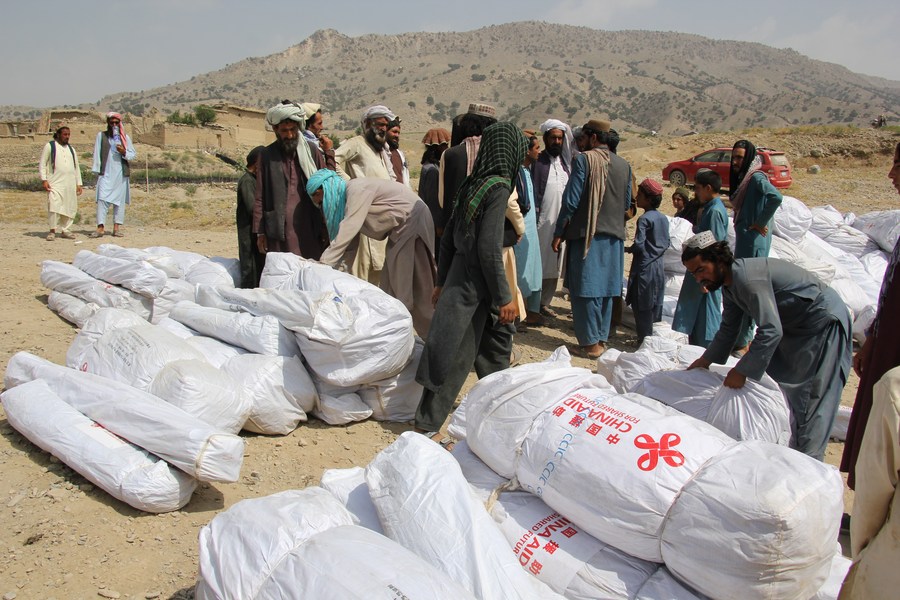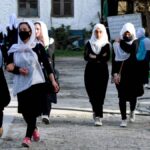On June 22, a 6.2-magnitude earthquake struck Khost and Paktika of Afghanistan, causing severe casualties. After learning about the earthquake, the Chinese government immediately expressed sympathy to the Afghan people and decided to provide RMB 50 million as emergency humanitarian aid to Afghanistan. The Chinese government also expressed that it would closely coordinate with the Afghan interim government to ensure the relief supplies would arrive at the disaster-affected people as soon as possible and assist the Afghan people to tide over the difficulties. China is also ready to work with Afghanistan in consolidating disaster prevention and mitigation, especially in monitoring and forecasting disasters. On June 27, the first batch of China’s relief supplies arrived in Afghanistan and were distributed quickly to those in need.
A sum of RMB 50 million is not a small amount for China. The Chinese people, however, lodged no complaint but unanimously expressed their great support. Meanwhile, the Chinese people, the local government, the Red Cross Society of China, and China’s enterprises, institutes, individuals, and others took action to offer what they came up with to assist Afghanistan. Up to now, various civilian donation events for Afghanistan are still being carried out. In fact, for a long time, especially after the tremendous change in Afghanistan last year, the Chinese government and people have not stopped their humanitarian aid to the Afghan people, even showing a greater momentum.
Since the earthquake, China has given the greatest and most substantial aid among all countries. China is also the fastest in implementing aid. The supplies, which are of great quality, pertinency, and practicality, have been unanimously praised by the Afghan interim government and people. It can be said that China’s fast and efficient aid to Afghanistan has once again given a vivid example of China’s long-term and constructive support to the Afghan people.
In recent years, China has seen a continuous improvement in the level of international aid and constantly implemented its value of a community with a shared future for humanity with its practical actions. In foreign aid, China has adhered to internationalism and the humanitarian spirit and contributed with its utmost efforts to offer the greatest timely assistance to foreign countries and their people when they are exposed to the threats of natural disasters, major infectious diseases, and others. This large-scale assistance to the Afghanistan earthquake disaster has once again highlighted China’s humanitarianism and worldwide affection. The international humanitarian spirit embodied in the concept of a community with a shared future for humanity exudes an attention-grabbing light.
The humanitarian spirit should be essentially people-oriented, valuing not only the safety of a nation’s people but also that of people in other countries as fellow human beings. There is a Chinese saying that one should care for aged people as one would one’s own aged parents and for young people as one would one’s own young children. China will never stand by with folded hands when a friend’s in trouble and never offer aid under the precondition of its self-interest. This reflects China’s righteousness and the Chinese people’s long-held principle. This is highly consistent with the Afghan people in following the traditional idea of establishing Hujra (Afghan’s cultural guest room) to entertain familiar or unfamiliar passing guests. It is similar to the hospitality of the Afghan people.
The Chinese government and people have held that when a large number of Afghan people are facing issues of survival and the right to life, the most significant and urgent task is to save lives. It should neither deliberately tie humanitarian aid to politics nor politicize the issues of humanitarian aid, human rights, and the right to development under the banner of politics, much less biasedly using them as weapons to torment those Afghans in suffering.
China has been actively engaged in and supported Afghan infrastructure and aided in the construction of a large number of hospitals, teaching buildings, roads, water conservancy facilities, and others which benefit people’s livelihood and promote development. China has been an active role model in supporting Afghan farmers, with measures such as opening up the air corridor for pine nuts, exempting the tariffs of Afghan agricultural products exported to China, training Afghan agricultural experts, and others. Each measure has reflected China’s substantial aid to the Afghan people.
China has been striving to build a mechanism integrating emergency aid and long-term aid, bilateral cooperative aid and multilateral cooperative aid, so as to create a sound comprehensive aid ecology combining the developmental aid and the national self-development capacities of Afghanistan, which will not only alleviate the current disaster faced by the Afghan people but also improve the abilities and confidence of the Afghan people in rebuilding their country, thus achieving the genuine reconstruction.
China’s timely aid has warmed the hearts of the Afghan people. Reading news releases on China’s aid to Afghan and relevant news published by China’s embassy in Afghan, many Afghan netizens have commented with high praises. It can be said that China’s aid has been providing multiple precious support for the Afghan people in calamities, added to the certainty and stability of the complex and difficult Afghanistan situations, and contributed to improving Afghan people’s living conditions and quality. When the Afghan people were mercilessly thrown off planes and ships by the United States, it was China and other countries that constantly reached out to help and maximize the relief of the dual physical and mental sufferings of the Afghan people.
Driven by its utter irresponsibility, the United States has completely abandoned Afghanistan and deliberately attempted to cast away the Afghan issues. Besides, the United States has purposefully leveraged other international issues to divert the attention of the American people and the international community.
This earthquake has resulted in severe casualties of nearly 5,000 and again revealed wounds that the American people are unwilling to mention. The reason a 6.2- magnitude earthquake leads to such a tragic result is that Afghanistan has extremely weak disaster warning and prevention capacities and poor living conditions and infrastructure. This has once again reflected that in the past 20 years, the United States has not made a substantive investment in Afghan national building and people’s livelihood. Trillions of U.S. dollars have been spent for military purposes, especially bombs. A large sum of them has flown back to the United States.
In response to the demand of the Afghan people and the international community for the release and return of Afghanistan assets, the United States has sometimes played deaf-mute or sometimes used domestic laws and regulations and executive orders as excuses. At the same time, the United States keeps coming up with various high-sounding excuses to set up obstacles for the international community to offer aid to Afghanistan. The United States intends to make an issue of humanitarian aid. It has used its discursive hegemony to influence and control the Afghan situation and attempted to install a switch operated by none but itself. This, in fact, shows that the United States has been applying a blunt knife to Afghan’s bleeding wounds. Facing the severe and incessant humanitarian crises in Afghan, it’s high time for the United States to completely change its style, which it should do, and to match words with deeds to assume its due responsibilities.
Zhu Yongbiao, professor, executive director of Research Center for the Belt and Road of Lanzhou University, director of center for Afghanistan Studies of Lanzhou University.













